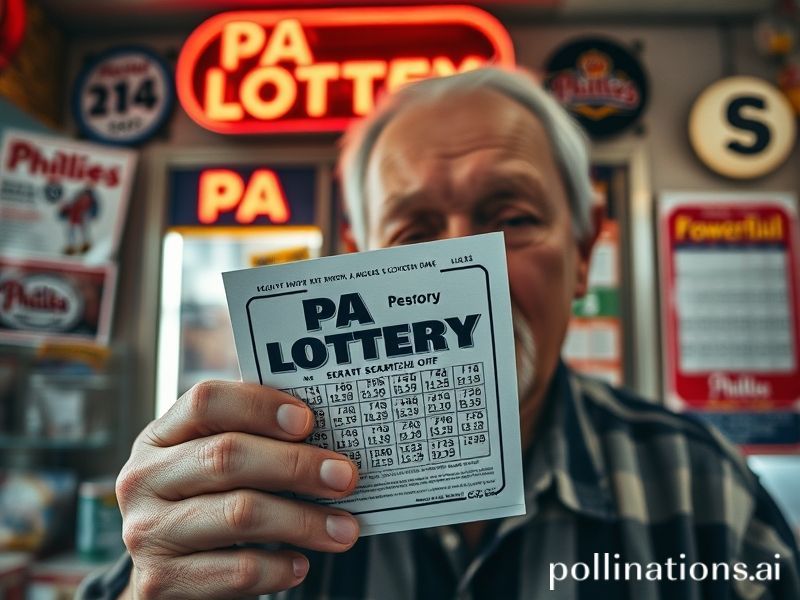How the Pennsylvania Lottery Became a Global Benchmark for Monetizing Hope
The Pennsylvania Lottery—PA Lottery to the locals—has quietly become a case study in how even earnest, middle-American gambling can reverberate from Lagos to London. On the surface it’s the same old heart-warming fairy-tale: scratch-offs that fund senior-citizen prescriptions, televised drawings presided over by a grinning host who looks like he teaches middle-school civics on the side. Yet step back, squint through the jet-lag, and the PA Lottery starts to look like a geopolitical mood ring.
First, consider the raw numbers. Last fiscal year the PA Lottery raked in $5.3 billion—roughly the GDP of Sierra Leone, give or take a couple of container ships of rutile. That haul is generated by a population smaller than Switzerland’s, which tells you something about the American talent for monetizing desperation at scale. While Swiss bankers refine the art of hiding money, Pennsylvanians have perfected the art of spending it three dollars at a time on the off chance they’ll never have to eat generic oatmeal again.
Internationally, the PA Lottery now serves as a darkly comic benchmark. When Ghana’s state lottery posted record revenues in 2023, Accra’s tabloids crowed that they were “catching up to Pennsylvania,” as though chasing a rust-belt state famous for scrapple and collapsing bridges were the new African Dream. Meanwhile, in Singapore—a city-state that fines you for chewing gum but runs one of the world’s most efficient lotteries—policy wonks cite the PA model to reassure nervous ministers that gambling can indeed coexist with geriatric welfare, provided you keep the marketing folks on a tight leash and the seniors on tighter oxygen tanks.
Currency traders in Hong Kong have taken to using PA Lottery sales as a minor indicator of U.S. consumer stress. When Powerball jackpots balloon, dollar-denominated assets wobble—Americans apparently sell blood, Bitcoin, or both to buy tickets. Analysts at Nomura even built a regression model: for every $100 million spike in multi-state jackpots, the greenback softens 0.04% against the yen, presumably because hope itself is inflationary. The quants call it the “Delaware Water Gap Indicator,” proving once again that finance will nickname anything to make it sound like it went to Princeton.
Europeans, ever smug, sniff that at least their lotteries fund Olympic athletes and opera houses rather than denture cream. Yet the same continent quietly imports Pennsylvania’s instant-game technology—those shiny pull-tabs printed by IGT in Reno and shipped through Antwerp to Tallinn. Nothing says pan-European solidarity like a 62-year-old Latvian pensioner scratching foil to reveal a cartoon Liberty Bell, unaware the ticket was conceived in a cubicle farm outside Harrisburg.
The darker punchline, of course, is how seamlessly the PA Lottery dovetails with global surveillance capitalism. Every barcode scanned at a Sheetz in Altoona feeds a data lake that Amazon Web Services hosts in Dublin. That information is then repackaged and sold to marketers from Manila to Manchester who want to know precisely which shade of nihilism persuades a 45-year-old woman to spend her last fiver on a “Wild Cherries” ticket instead of bread. GDPR be damned; desperation is the one commodity that never needed a passport.
Still, credit where it’s due: the PA Lottery mails annual letters to winners reminding them that anonymity is an option—an act of mercy that, translated into the vernacular of other nations, sounds almost Scandinavian. Try telling that to the newly minted millionaire from Scranton who discovers that the IRS, his ex-wife, and a long-lost cousin in Lagos all speak the same dialect of congratulations.
So what does the Pennsylvania Lottery mean in the grand tapestry of late-stage capitalism? Simply this: it is the fluorescent-lit confession booth where rust-belt anxiety meets globalized extraction, wrapped in a red-white-and-blue foil that says “Benefits Older Pennsylvanians.” The world watches, half-horrified, half-admiring, then quietly buys the franchise rights. Because if there’s one export America still leads in, it’s the industrialization of hope—and the invoicing of its inevitable disappointment.







